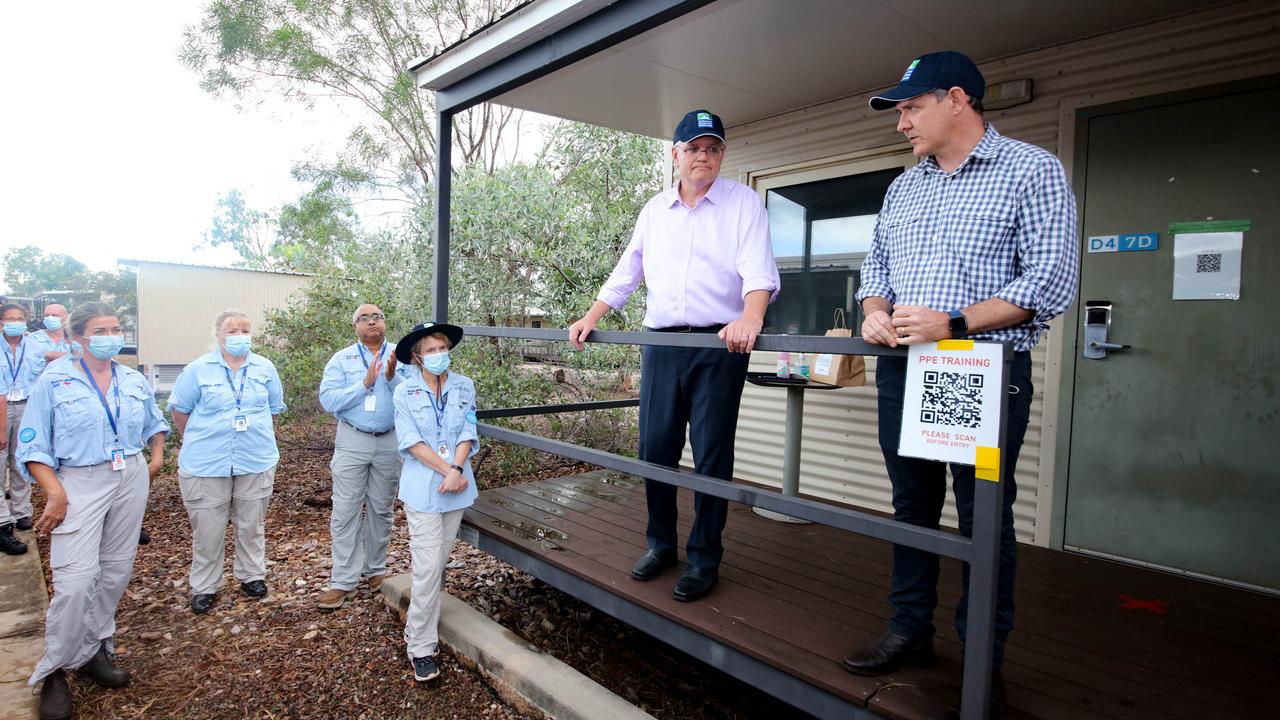Critics argue Australia’s India travel ban a ‘massive over-reaction’
Australia suspended flights with India as COVID cases rise by up to 600 per cent in some hotels – but critics say the move is a grave error.

Australia is grappling with a huge increase in the number of COVID-19 cases in hotel quarantine — up 600 per cent in some facilities — but some are questioning whether the suspension of flights from India is appropriate.
The Federal Government announced this week that it would suspend flights from India, leaving thousands stranded, including 650 registered as vulnerable, to give facilities in Australia breathing space as they struggle to contain a growing number of cases.
Health Minister Greg Hunt confirmed late on Friday night that Australians who return to the country from India will face five years in jail, a $66,000 fine, or both. It is the first law in Australia’s history making it illegal for citizens to return home.
Data analyst Anthony Macali, founder of COVID Live, said there had been a substantial increase in positive cases in hotel quarantine, but unfortunately, it was not possible to know which countries these cases were coming from.
“We can definitely see NSW, Queensland, South Australia, Northern Territory all reaching levels of overseas acquired infections that we haven’t seen since the beginning of the pandemic,” he told news.com.au.
In NSW, the seven-day average for positive cases is now around nine to 10 cases a day.
“We’ve never hit that level before,” he said.
As a comparison, in February and March, there were on average two to three cases a day in NSW quarantine, and this has sometimes reached around six or seven cases a day.
“If there are more cases there is a higher chance of breaches occurring,” Mr Macali said.
“It doesn’t necessarily mean you will get a breach but you should obviously be on high alert and it’s testing the limits because we have never taken this many positive cases from overseas before,” he said.
It’s a similar story in the Northern Territory. Its Howard Springs quarantine facility hasn’t had any breaches in six months since it opened, but Mr Macali said it was previously only dealing with one or two positive cases a day.
“In the last two weeks this has jumped from an average of under one, to almost six cases a day, which is huge. It’s a 600 per cent increase,” he said.
RELATED: Australia’s ‘negligence’ over virus leaks

While authorities including in NSW have noted an increase in the number of positive cases in travellers returning from India, Mr Macali said this was not yet clear in the publicly available figures, as they were a week behind.
Unlike New Zealand, which published details of cases when it also banned flights from India on April 11, Australian authorities did not publish a breakdown of where cases were coming from.
Mr Macali said the lack of information in Australia made it difficult to understand the scale of the problem and to debate whether other options could be considered.
A Northern Territory Health spokeswoman told news.com.au there had been 122 positive cases among overseas travellers since October 23.
“Positive cases have left departure ports in India, United Kingdom, Germany, France, South Africa,” she said.
The latest weekly data from NSW Health found 35 per cent of cases in the state’s hotel quarantine system were from Indian travellers in the four weeks up to April 24.
Of the 137 cases, 48 cases were from Indian travellers, 14 per cent (19 cases) were from Bangladesh and 10 per cent (14 cases) were from the United States.
“In March and April 2021, there has been an increase in detections of COVID-19 in travellers from India, Bangladesh and Pakistan,” the report said.
Is travel ban a ‘massive over-reaction’?
Prime Minister Scott Morrison told reporters on Tuesday that there had been a concerning increase in the percentage of cases in hotel quarantine that had their origins in India.
He said in the week beginning April 16, there had been a jump in the total number of cases in quarantine that had so far not been recorded this year.
“It went from 90 the previous week to 143 the following week,” he said.
He said the change was particularly noticeable in the Northern Territory and New South Wales, which both have direct flights from India.
Almost 95 per cent of cases in the NT were coming from India, he said.
“So it’s important to take this pause to enable those quarantine facilities, particularly in the Northern Territory, to be able to work through the system and return to lower levels, so we will be able to resume supporting getting Australians home,” he said.
Travellers from high risk countries, which so far only includes India, will also be asked to return a negative PCR test 72 hours prior to entering Australia from the final point of embarkation.
Mr Morrison pointed out that flights from Papua New Guinea to Queensland were similarly suspended in March, which saw the number of infections from that country drop significantly.
“That has meant that the system in Queensland has had the stress come off it from the Papua New Guinean arrivals and that’s proved to be very effective,” he said.
He said the “pause arrangement” gave facilities the opportunity to ensure they could deal with cases and then enable authorities to “step off from a stronger position in a few weeks’ time”.
However, one journalist asked whether the flight ban was a “massive over-reaction”.
There has been only 16 breaches in hotel quarantine among the 160,000 arrivals in the six months between October 27 and April 22, representing just 0.01 per cent of those who go through the system.
Mr Morrison said the advice of the NT Government and the Federal Government’s medical advisers was “we need to slow that pace significantly over the next few weeks to ensure that we can maintain the health of people in that facility”.
RELATED: How did India’s COVID crisis get so bad?

“This will also give some breathing space to the NSW arrangements and allow in NSW people from other countries to come back and go through that quarantine system,” Mr Morrison said.
“We have always taken a cautious approach. Australia can speak of a performance during the global pandemic on COVID-19 that few countries can, and one of the reasons for that is we’ve always listened to the medical advice.”
‘An act out of fear’
But University of NSW Professor Mary-Louise McLaws, who is a World Health Organisation adviser, has noted a Guardian analysis of data showed India had fewer cases per capita than either the United States or the United Kingdom during their COVID peaks.
She said the data suggested the Morrison Government’s ban on flights from India was likely “an act out of fear” and it must offer a route home for citizens “to ensure there is no misconception the ban is in any way racist”.
Communications specialist Parnell Palme McGuinness said it was devastating that flights from India had been cut rather than increased.
“This is a decision about cutting off flights, which is just unconscionable,” Ms McGuinness said while on ABC’s Q&A panel on Thursday.
“They are flying supplies to make vaccine and provide oxygen to India. And the planes are coming back empty.
“They need to be coming back filled with people who need help.”
India is in the grip of a devastating outbreak, surpassing more than 18 million cases this week and setting a new single-day record on Thursday after confirming 379,257 cases and 3645 deaths.
Constitutional law PhD candidate at Melbourne Law School, Liz Hicks, noted that a defective quarantine system not designed to accommodate aerosol transmission will continue to leak even with the reduced cap.
“It will merely do so at a lower rate,” she wrote in The Conversation.
“Australian governments have argued it is necessary to reduce the number of positive cases in quarantine. This implicitly acknowledges fundamental flaws in Australia’s hotel quarantine programs.”




